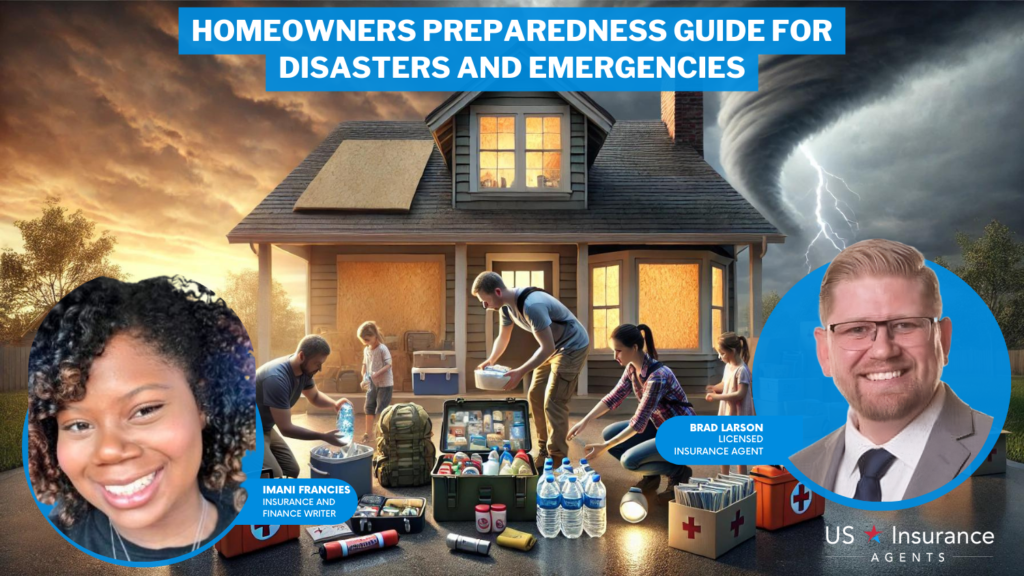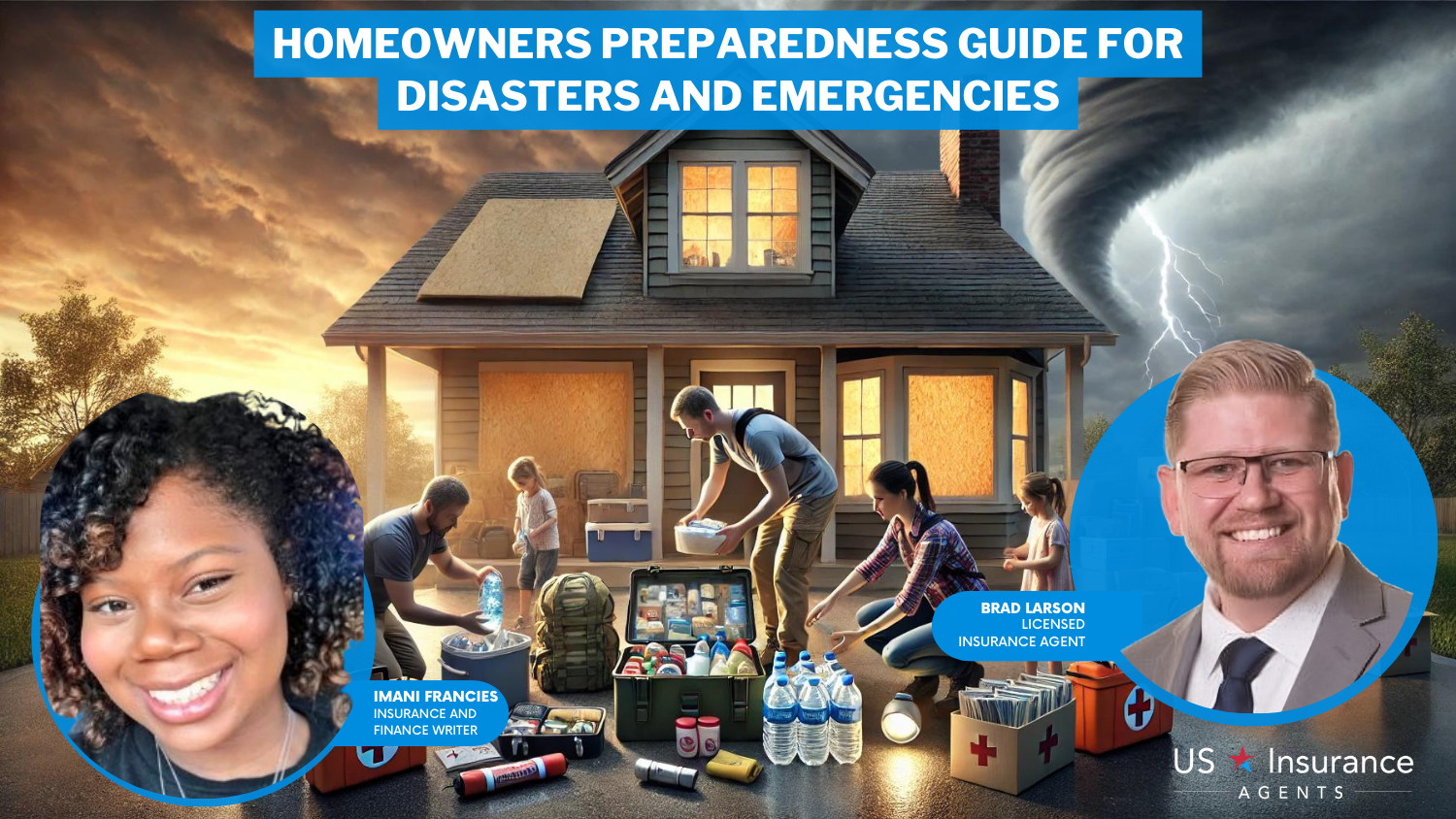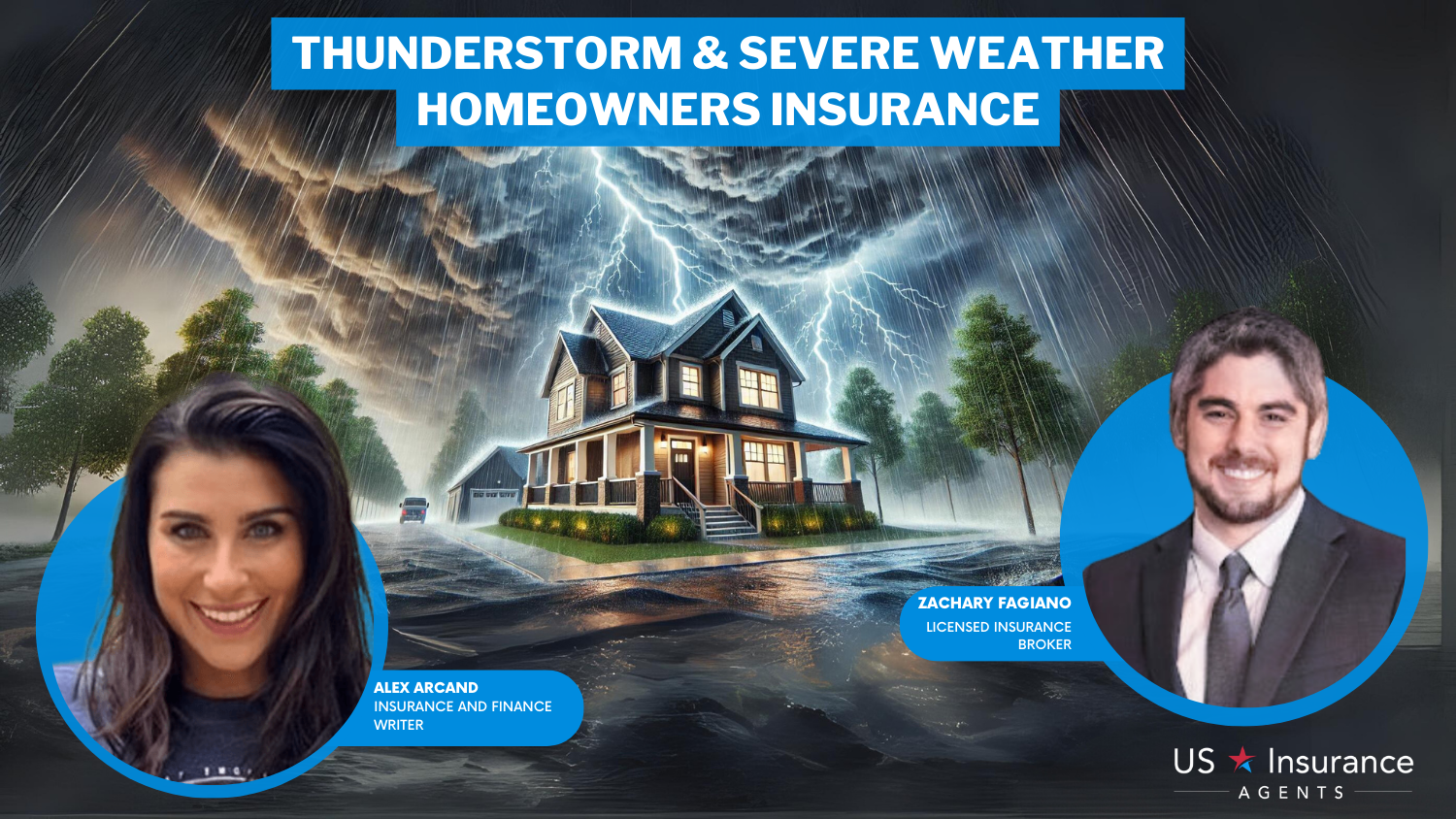Homeowners Preparedness Guide for Disasters and Emergencies
Stay prepared for the unexpected with our comprehensive homeowners preparedness guide for disasters and emergencies. Discover valuable insights, practical tips, and essential resources to safeguard your home and loved ones. Be proactive and ensure readiness in the face of potential crises. Trust us to help you navigate uncertain times.
Read more Secured with SHA-256 Encryption





Table of Contents
Table of Contents


Insurance and Finance Writer
Imani Francies is a finance and insurance writer who has strong media and communication skills with a bachelor's degree from Georgia State University. She began her writing career freelancing with various blogs and internships while working full-time as an early childhood educator. She has significant experience in both print and online media as a writer, editor, and author. She works efficient...
Imani Francies


Sr. Director of Content
Sara Routhier, Senior Director of Content, has professional experience as an educator, SEO specialist, and content marketer. She has over 10 years of experience in the insurance industry. As a researcher, data nerd, writer, and editor, she strives to curate educational, enlightening articles that provide you with the must-know facts and best-kept secrets within the overwhelming world of insurance....
Sara Routhier


Licensed Insurance Agent
Brad Larson has been in the insurance industry for over 16 years. He specializes in helping clients navigate the claims process, with a particular emphasis on coverage analysis. He received his bachelor’s degree from the University of Utah in Political Science. He also holds an Associate in Claims (AIC) and Associate in General Insurance (AINS) designations, as well as a Utah Property and Casual...
Brad Larson
Updated January 2025
Welcome to our comprehensive Homeowners Preparedness Guide for Disasters and Emergencies. In this informative article, we delve into essential topics to equip you with the knowledge and tools necessary to protect your home and loved ones in times of crisis.

Discover expert advice on disaster preparedness, emergency planning, home safety measures, and more. From creating a robust emergency kit to securing your property against natural disasters, we cover it all. Don’t wait until it’s too late—take proactive steps to ensure your readiness.
Enter your zip code now to compare rates from top insurance providers and secure comprehensive coverage that fits your needs. Peace of mind starts here.
Natural Disasters
Natural disasters can happen everywhere and anywhere. Although it’s unlikely that a blizzard will happen in Florida, for example, being prepared for when nature threatens your home is important, and can take many shapes and forms.
Avalanches
An avalanche can be scary, and it can happen very quickly. You should always know if you are in an area that has a potential for avalanches. If you are, you should be sure to keep an eye on any avalanche alerts. Be prepared to leave very quickly. Having a small bag with any essential documents and some essential supplies is a great idea if you are in this zone.
Resources:
National Avalanche Center: Get the training
Avalanche.org: Avalanche Encyclopedia
Blizzards
Pretty snowfall is one thing. A blizzard, a snowstorm that lasts a long time and results in a heavy amount of snow, is totally different. These storms can cut power and make travel difficult, if not impossible. Staying warm and having enough food and water are key, so insulating your house well and keeping a store of food that doesn’t have to be heated, as well as bottled water in case your pipes freeze, are all good ideas.
Resources:
Ready.gov: Snowstorms and extreme cold
United States Search and Rescue Task Force: Blizzards
Earthquakes
Earthquakes are hard to predict, they don’t just occur in winter, and almost anywhere can be hit by an earthquake, although some places are more susceptible due to fault lines. If you live in an area that has a history of earthquakes, you should make sure to know where to go during an earthquake, how to safely evacuate if needed, and what supplies you’ll need. Bottled water, food, and important documents and medications should all be kept together in case of an earthquake.
Resources:
US Geological Survey: Prepare
United States Department of Labor Occupational Safety and Health Administration: Earthquake preparedness and response
Extreme Heat
Extreme temperatures, whether heat or cold, can be dangerous. Extreme heat is particularly dangerous for seniors, young children, those who work outside, and pets. Making sure to get your air conditioner regularly serviced can be a good measure to take before any extreme heat waves, and it never hurts to check on any elderly neighbors.
Resource:
National Weather Service: Heat safety
Floods
Floods can happen almost anywhere. You may need to evacuate, and when you return, you may have extensive damage to your home and belongings. Being prepared by having a bag to grab in an emergency, lots of bottled water in case of water contamination, and an emergency evacuation plan can all be helpful if a flood threatens your home.
Resources:
American Red Cross: Flood safety
North Dakota State University: Flood preparedness and response
Hurricanes
Hurricanes generally happen close to the coast, but their effects can be felt far inland as well. You may have some advance warning, but having the materials to board up your home, knowing the best evacuation route, and having supplies at home in case you stay and lose power are all great preparedness ideas to avoid being caught scrambling.
Resources:
National Hurricane Center: Hurricane preparedness, be ready
Caribbean Disaster Emergency Management Agency: Hurricane preparedness tips for home
Tornados
Tornados can show up quickly and without warning. Learning about tornado safety is important even if you don’t like in a place prone to tornados is important. Things like creating a plan, picking a safe room in your home to shelter, and learning to administer first aid can make your family safer and make you an invaluable aid for others.
Resources:
Missouri Storm Aware: Preparing for a tornado
Healthy Children: Tornado preparedness: tips for families
Landslides
Landslides, like floods and avalanches, can wreak havoc on your home. It may be important to evacuate quickly and with little advance notice, so if you live in an area where a landslide could occur, you should absolutely have a “go bag” and a plan to let your friends and family know you have evacuated safely.
Resource:
United States Congress: National Landslide Preparedness Act
Lightning
Lightning can occur with even the smallest of storms, but you should always keep an eye on lightning happening near your home or wherever you are. Make sure to stay away from windows, unplug anything you can, use grounded outlets, and don’t go outside!
Resources:
Centers for Disease Control and Prevention: Lightning
University of Nebraska-Lincoln: Lightning
Tsunamis
Tsunamis are mostly limited to coastal areas, but even people living inland may experience flooding or other issues. Tsunamis sometimes give warning, but it still is important to have an evacuation plan and a plan to get any essential out of your home quickly.
Resource:
National Oceanic and Atmospheric Administration: Tsunami
Volcanoes
Chances are that if you live near an active, or even a dormant, volcano, you know and have plans in place to prepare if it ever erupts. But active volcanoes can impact people far away from the volcano as well. Since volcanos can erupt or ooze for months or years, as well as spread ash, knowing the dangers is important and having an evacuation plan can help keep you safe.
Resources:
National Geographic: Volcano safety tips
University of Hawaii at Hilo: Evacuating during volcanic activity
Wildfires
Wildfires can happen almost anywhere, and it is essential that if there is a threat of a wildfire you be prepared to evacuate and pay close attention to warning, evacuation orders, and the progress of the fire.
Resources:
National Fire Protection Association: Wildfire Preparedness
Ready for Wildfire: Prepare for wildfire
Free Home Insurance Comparison
Compare Quotes From Top Companies and Save
Secured with SHA-256 Encryption
Other Disasters and Emergencies
Beyond natural disasters, many other emergencies can occur. Although you should hope for the best, preparing for the worst is always the best course of action. These emergencies can impact almost anyone, and being prepared is key to protecting your home and family.
Home Fire
A home fire, no matter how large or small, can be devastating. Material possessions can sometimes be replaced, but it is a good idea to scan all important documents or photos into a cloud drive, and you should regularly remind your family where the fire extinguisher is and how to quickly evacuate, as well as fire prevention tips.
Resources:
National Safety Council: National fire prevention week
Bainbridge Island Fire Department: Fire prevention facts
Carbon Monoxide
Carbon Monoxide poisoning is a real threat, but knowing the signs, keeping a working and active carbon monoxide detector in your home, and knowing what to do if you are exposed to dangerous amounts of carbon monoxide are great ways to cut down your risk.
Resources:
Mayo Clinic: Carbon monoxide poisoning
International Association of Certified Home Inspectors: Carbon monoxide poisoning and detectors
Car Accidents and Breakdowns
Car accidents can happen to anyone, and can range from an inconvenience to a life-threatening emergency. If you are in a minor accident, try to move your car over to the side of the road and stay out of traffic that could compound the accident. Never move someone who is not moving themselves after an accident.
Resources:
Tufts University: Motor vehicle crash
University of Dayton: Car accident preparedness kit
Emergencies when Traveling
When traveling, the last thing you want is to deal with an emergency. Some simple preparation can make those emergencies easier to manage when they occur. Keep copies of your ID and credit cards in a safe place you can access, and always note your emergency contact in your phone!
Resources:
US Department of State: Get help in an emergency
Medicare.gov: Travel
Poison Emergencies
Poison can be a real danger for kids and pets in particular. Knowing how to keep poisons safe and who to call if an emergency does occur is very important! Always clearly label any household poisons and keep them as far away from food or common areas as possible.
Resources:
American Association of Poison Control Centers: Prevention
Health Resources and Service Administration: Resources
Terrorism
Acts of terrorism are becoming more and more frequent. We should not be afraid, because that’s the point of terrorism, but should be prepared. Especially when traveling, always let someone know approximately where you are going and always have an emergency contact stored in your phone.
Resources:
Federal Bureau of Investigation: Terrorism preparedness
FEMA: Terrorism
First Aid
First aid is an invaluable skill to learn. Not only can it help you keep you and your family safe, it also can help you be an asset in an emergency. First aid kits are widely available, and learning basic first aid, like CPR, can help save a life.
Resources:
Healthfinder.gov: Learn first aid
YMCA Twin Cities: CPR training
Read more: Best Business Insurance for First Aid Training Companies
Emergency Preparedness Kits
Like a first aid kid, everyone should have an emergency preparedness kit. These kits generally include bottled water, a flashlight, pet food, garbage bags, crank radio, and much more. They can be kept in a sturdy bag or a storage container.
Resources:
South Carolina Emergency Management Division: Family emergency kit
Free Home Insurance Comparison
Compare Quotes From Top Companies and Save
Secured with SHA-256 Encryption
Planning Ahead
The best way to prepare for any kind of disaster is be prepared. Although it may seem like a lot of work, preparing ahead can be the difference between a stressful situation and a tragic one. All of the tips and resources above can help you plan ahead for emergencies, although hopefully you never have to go beyond that!
Resources:
University of Florida: Emergency management university plans
Oregon State University: Emergency management
Post Disaster Recovery
If you are in a disaster, you may have to evacuate or reassess and regroup, sometimes without power, water, or access to goods and services. You should always let people know you are safe, and you should look for city or state resources that are trained in and available during post-disaster management.
Resources:
American Bar Association: Post disaster resources and assistance
Disaster Assistance: Other recovery help
Disaster Preparedness for Kids
Kids can help with disaster preparedness as well! It’s especially important to teach kids about preparedness so that they can be responsible for themselves and help keep everyone safe. Kids should also learn that an emergency is time to listen to an adult.
Resources:
State of Utah: Ready…set…prepare! A disaster preparedness activity book
Sesame Street: Emergency preparation
Free Home Insurance Comparison
Compare Quotes From Top Companies and Save
Secured with SHA-256 Encryption
Disaster Preparedness for Business Owners
Business owners should prepare for emergencies both at home and their business. There can be disaster assistance available for small business, but owners should never put their business above their safety or that of their employees, and should always keep the same emergency supplies at work as they do at home.
Resource:
Small Business Administration: Prepare for emergencies
Disaster Preparedness for Pet Owners
Pet owners have another level of responsibility, pets aren’t able to take care of themselves in emergencies. Pet owners have to make sure they have first aid and emergency kits that are useful for their pets, that they have a way to evacuate their pets, and that they keep their pets microchipped, up to date on shots, and on a leash during any emergency evacuation.
Resources:
ASPCA: Disaster preparedness
American Veterinary Medical Foundation: Pets and disasters
Case Studies: Homeowners Preparedness Guide for Disasters and Emergencies
Case Study 1. Hurricane Resilience: The Smith Family
In August 2022, the Smith family in a coastal town prepared for an approaching hurricane. They implemented a comprehensive emergency plan by securing their home, reinforcing windows and doors, bringing outdoor furniture inside, and trimming trees. They also assembled an emergency kit with essential supplies like food, water, medications, flashlights, and a battery-powered radio.
They also communicated their plans with neighbors and stayed informed through local emergency services. As a result, the Smiths were able to ride out the storm safely, minimizing property damage and ensuring their well-being.
Case Study 2. Wildfire Preparedness: The Johnsons
Living in a wildfire-prone area, the Johnson family had witnessed the devastating consequences of uncontrolled blazes. Determined to safeguard their home and loved ones, they implemented several measures. They created a defensible space around their property by removing dead vegetation, maintaining a fire-resistant landscape, and installing ember-resistant vents.
The Johnsons also collaborated with their local fire department, participating in community-wide fire drills and staying informed about fire weather conditions. When a wildfire broke out near their area, their preparedness paid off. They promptly evacuated, following established evacuation routes, and their home was spared from destruction.
Case Study 3. Severe Weather Resilience: The Martinez Family
Living in an area prone to severe storms, the Martinez family experienced the challenges of unpredictable weather firsthand. After enduring property damage from a previous storm, they took proactive steps to enhance their resilience. They installed storm shutters on their windows, reinforced their roof, and ensured their gutters were clear of debris.
The Martinez family also signed up for weather alerts through their local emergency management agency and designated a safe room within their home. When a severe thunderstorm hit, they quickly took shelter in their safe room, preventing injury and minimizing property damage.
Case Study 4. Earthquake Readiness: The Chen Family
Residing in an earthquake-prone region, the Chen family recognized the necessity of earthquake preparedness. They conducted a seismic evaluation of their home, retrofitting it to withstand potential seismic activity. The Chen family secured heavy furniture, appliances, and hazardous materials to prevent them from toppling during an earthquake.
They also organized a family emergency communication plan, designating a meeting point in case of separation. When a significant earthquake struck, the Chen family followed their plan, ensuring their safety and facilitating a swift response from emergency services.
Case Study 5. Power Outage Management: The Thompsons
The Thompson family lived in an area prone to frequent power outages due to extreme weather conditions. They devised a comprehensive plan to handle such situations effectively. The Thompsons invested in a generator to provide backup power, stocked up on non-perishable food and water, and had alternative heating methods available.
They also equipped their home with battery-powered lights and a hand-cranked radio for communication. When a severe storm knocked out the power in their neighborhood, the Thompsons relied on their preparedness measures, maintaining essential services and minimizing the disruption to their daily lives.

Frequently Asked Questions
What is Homeowners Preparedness Guide for Disasters and Emergencies?
The Homeowners Preparedness Guide for Disasters and Emergencies is a comprehensive resource that provides homeowners with valuable information on how to prepare for and respond to disasters and emergencies that may occur in their homes.
How can homeowners prepare for disasters and emergencies?
Homeowners can prepare for disasters and emergencies by creating an emergency kit, developing an evacuation plan, and staying informed about potential threats.
What should homeowners include in their emergency kit?
Homeowners should include basic supplies such as water, non-perishable food, a first aid kit, flashlights, and batteries in their emergency kit.
How can homeowners protect their home from disasters and emergencies?
Homeowners can protect their home from disasters and emergencies by ensuring that their insurance coverage is up-to-date, securing loose items around the property, and making necessary repairs to the home.
What should homeowners do during a disaster or emergency?
During a disaster or emergency, homeowners should follow their evacuation plan and stay informed about the latest updates and instructions from local authorities.
How can homeowners prepare for disasters and emergencies?
After a disaster or emergency, homeowners should assess their home for damages, document any losses, and contact their insurance company to file a claim.
What types of disasters and emergencies are covered in the Homeowners Preparedness Guide?
The guide covers a wide range of disasters and emergencies such as floods, earthquakes, hurricanes, tornadoes, wildfires, and power outages.
Get a FREE Quote in Minutes
Insurance rates change constantly — we help you stay ahead by making it easy to compare top options and save.


